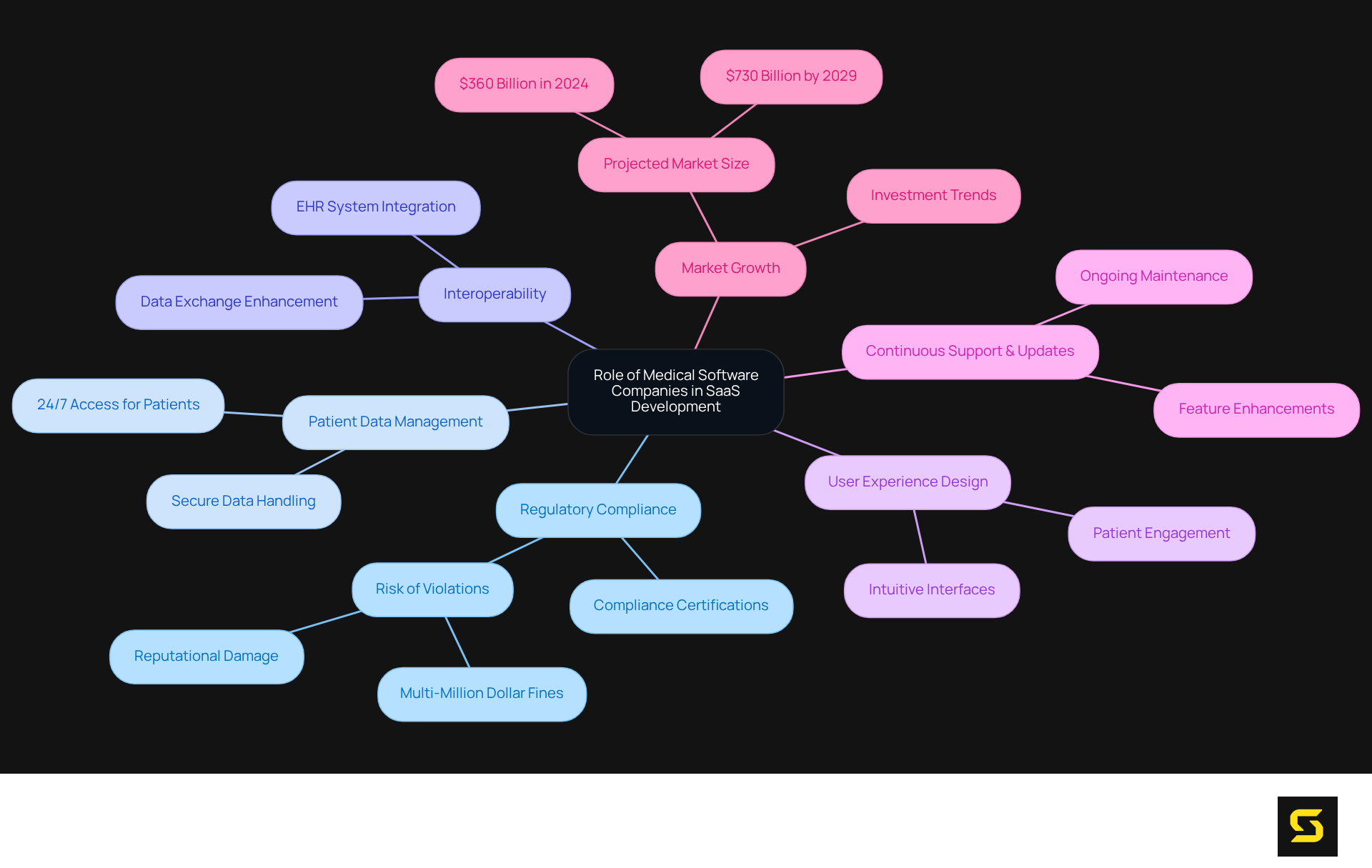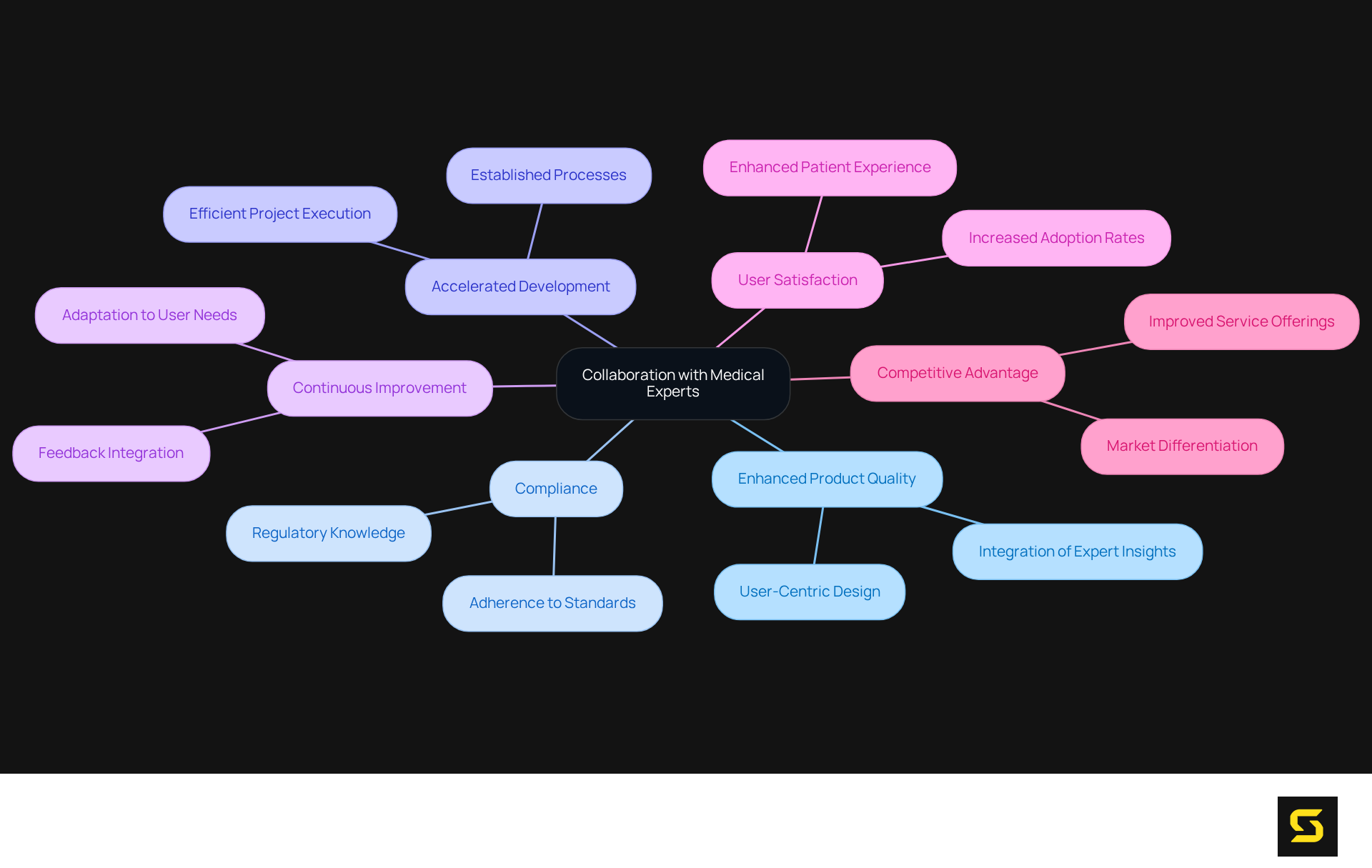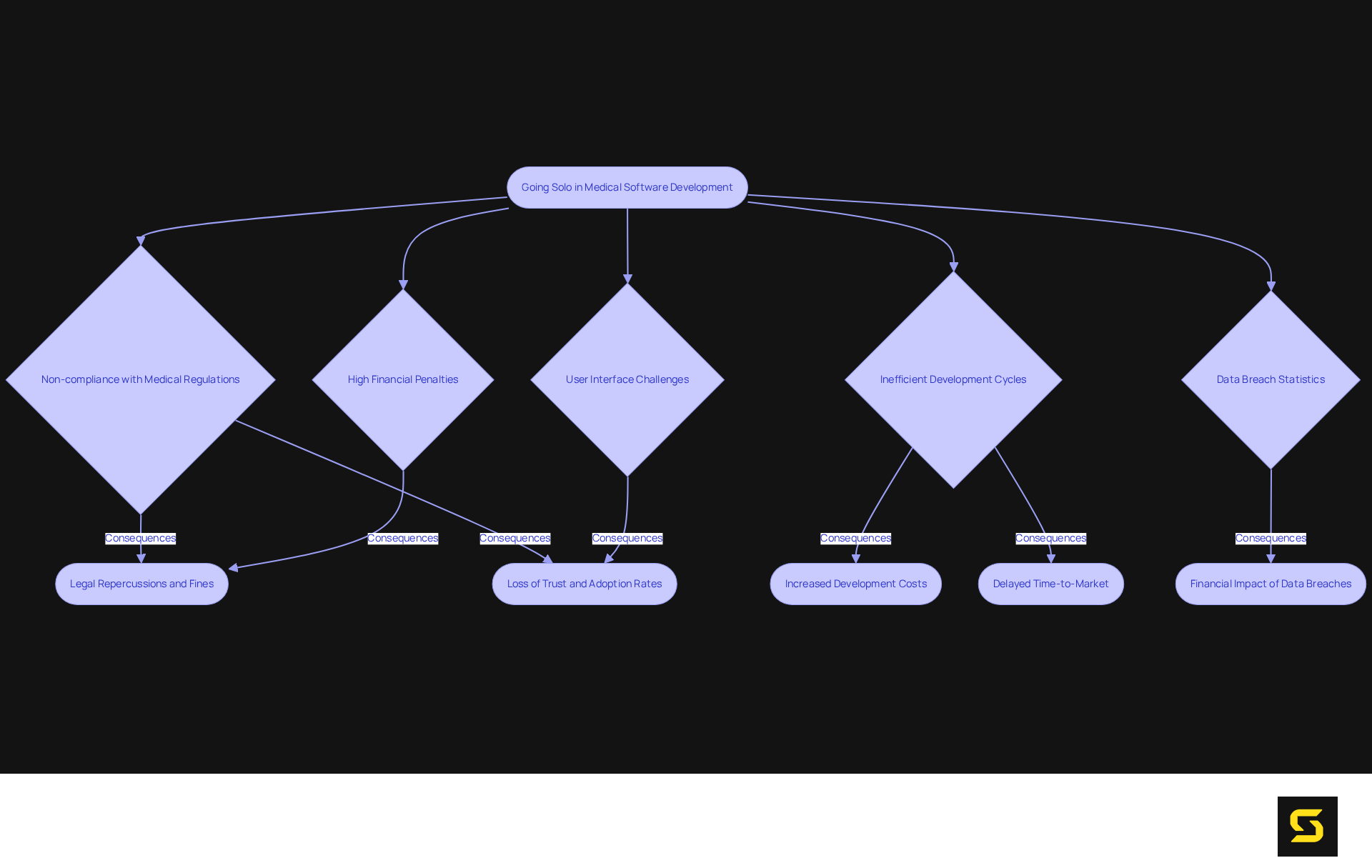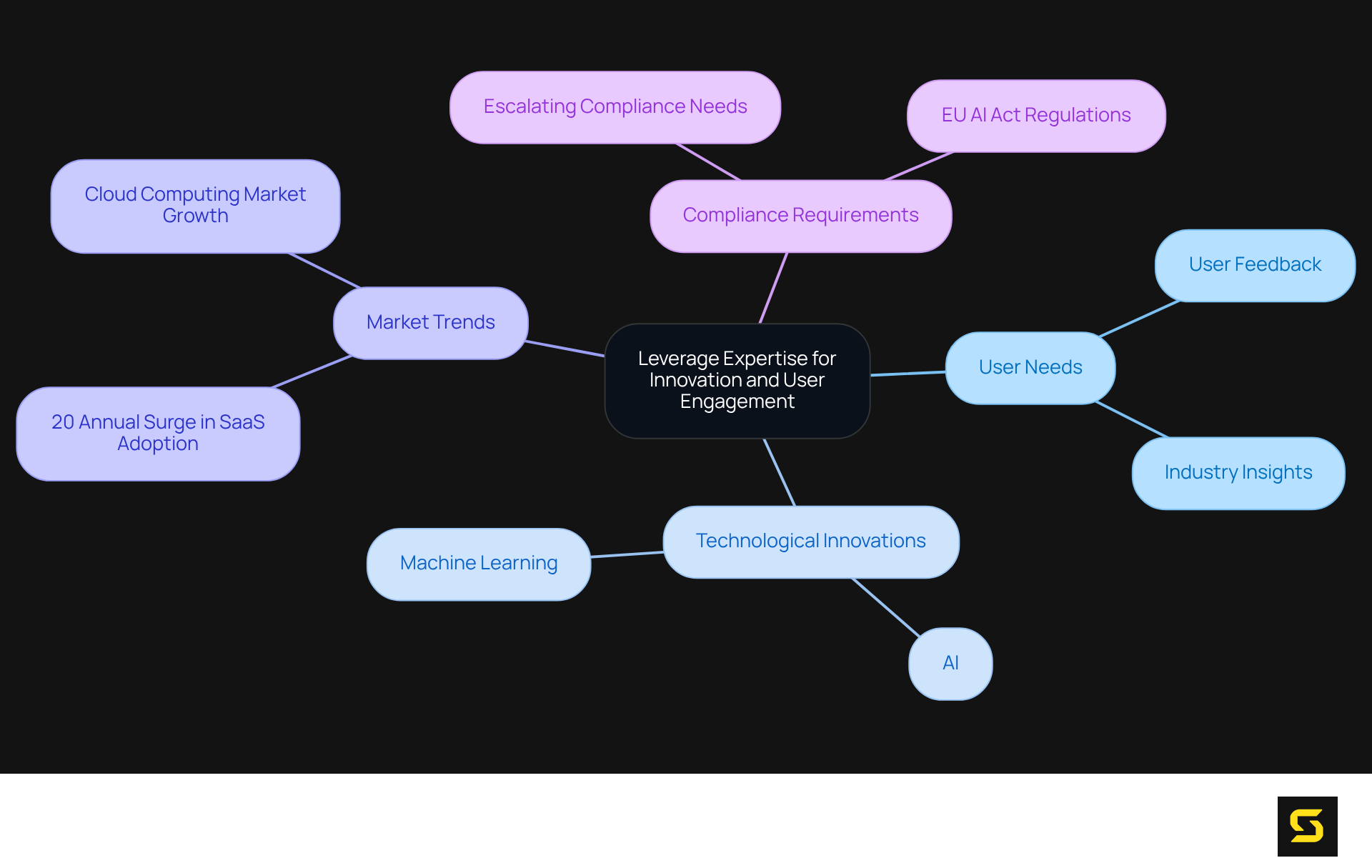Overview
Partnering with a medical software company is essential for enhancing SaaS success, as it brings specialized expertise in:
- Regulatory compliance
- Patient data management
- User experience design
These elements are critical for developing effective healthcare applications. Such collaborations not only lead to improved product quality but also significantly reduce the risks of non-compliance and foster increased innovation. Ultimately, these partnerships result in better patient care and operational efficiency, which are vital in a rapidly evolving medical landscape. Engaging with a medical software partner is not just a strategic move; it is a necessary action for those aiming to excel in the healthcare technology arena.
Introduction
The intersection of healthcare and technology is evolving at an unprecedented pace. Medical software companies are emerging as key players in the software-as-a-service (SaaS) landscape. These specialized firms not only ensure compliance with stringent regulations but also enhance the development of innovative solutions tailored to the unique needs of healthcare providers. However, one must consider: what are the potential pitfalls of navigating this complex terrain without their expertise?
Exploring the benefits of collaboration with medical software experts reveals not only the opportunities for innovation and efficiency but also the significant risks associated with going solo in medical software development.
Understand the Role of Medical Software Companies in SaaS Development
Medical technology firms serve as pivotal players in the cloud-based services landscape, particularly within the medical sector. They are dedicated to developing technological solutions that comply with stringent regulatory standards while addressing the unique needs of medical service providers. These organizations possess extensive expertise in patient data management, interoperability, and user experience design—elements that are vital for the creation of effective SaaS applications. Their proficiency ensures that systems not only fulfill technical requirements but also align with the operational objectives of healthcare organizations.
Moreover, a medical software company frequently offers continuous support and updates, which are essential for maintaining compliance and enhancing functionality over time. This collaborative strategy fosters innovation and guarantees that SaaS solutions are both effective and user-friendly, ultimately elevating patient care and operational efficiency.
Industry forecasts predict that the medical IT market will grow from $360 billion in 2024 to over $730 billion by 2029, underscoring the increasing importance of these collaborations. As Slava K., CEO of TATEEDA, states, "Since the digital shift of the early 2020s, Healthcare IT has really taken center stage. Cloud technology, AI, and big data are now central to medical services, transforming the approach to care management." This underscores the vital role that a medical software company plays in and ensuring compliance in the rapidly evolving medical field.

Explore the Benefits of Collaboration with Medical Software Experts
Collaborating with medical application specialists provides service providers with a wealth of benefits that can significantly enhance the quality of their products. These specialists bring extensive knowledge of medical regulations, patient needs, and the latest technological advancements, empowering SaaS providers to create solutions that are both compliant and innovative. This collaboration often results in accelerated development cycles, as medical technology firms typically employ established processes and frameworks that enhance project execution efficiency.
Furthermore, such partnerships foster a culture of continuous improvement. Insights from medical experts can be seamlessly integrated into the development lifecycle, ensuring that the final product adapts to the evolving needs of users. This synergy not only enhances user satisfaction but also increases adoption rates, ultimately providing a .
As highlighted in the 'Future of Healthcare Technology' case study, tailored application development is recognized as a strategy to address unique operational challenges and empower medical practitioners to deliver exceptional patient care. Moreover, data indicates that projects involving expert collaboration can lead to substantial improvements in efficiency and patient satisfaction, underscoring the critical role that medical technology knowledge plays in elevating service quality. By leveraging this expertise, a medical software company can navigate the complexities of medical technology more effectively, resulting in superior products that meet the demands of the industry.
Randolph Bias asserts that "good design goes far beyond aesthetics as it’s fundamentally tied to safety, efficiency, and patient trust," further emphasizing the necessity of incorporating expert insights into the development process.

Identify Risks of Going Solo in Medical Software Development
Navigating the medical software company development landscape without specialized support exposes SaaS providers to substantial risks. A primary concern is the potential for non-compliance with medical regulations, which can result in severe legal repercussions and financial penalties. For instance, the typical expense of a data breach in the medical sector can amount to around $8.6 million, and a single breach might exceed $50,000, underscoring the financial risks involved. Furthermore, without the insights of medical technology specialists, organizations may struggle to create user-friendly interfaces that meet the requirements of medical professionals and patients, leading to low adoption rates and ultimately hindering application success.
The absence of established processes and frameworks can also lead to inefficient development cycles, escalating costs, and delayed time-to-market. In a rapidly evolving industry, these setbacks can be detrimental. Organizations that fail to may face penalties exceeding $50,000 per violation, and the application of sanctions for HIPAA violations must be documented and stored for at least six years, emphasizing the critical need for adherence to compliance standards. Moreover, statistics indicate that 60% of medical organizations encountered breaches related to personal data mismanagement, highlighting the dangers of pursuing independent development in medical applications. Given these challenges, it is essential for service providers in the cloud to explore collaborations with a medical software company and medical application specialists to mitigate risks and enhance their prospects for success in the competitive healthcare environment.

Leverage Expertise to Drive Innovation and User Engagement
Harnessing the expertise of a medical software company is imperative for driving innovation and enhancing user engagement in cloud-based applications. These specialists possess profound insights into user needs and industry trends, which allows them to provide critical contributions that shape product development. By integrating user feedback and market research into the design process, software-as-a-service companies can develop solutions that are not only functional but also engaging and intuitive.
Moreover, medical technology experts from a medical software company can introduce cutting-edge innovations, such as artificial intelligence and machine learning, which can substantially enhance the functionalities of cloud-based products. As Andrei Neacsu asserts, "AI and ML are enhancing the robustness of software applications." This fusion of advanced technology not only elevates user experience but also positions the software as a market leader.
Additionally, with the healthcare sector experiencing a 20% annual surge in software adoption, it is crucial for organizations to adeptly navigate the escalating compliance requirements associated with AI. Ultimately, by leveraging specialized knowledge and aligning with strategic business objectives, SaaS companies can cultivate a culture of innovation that propels growth and secures long-term success.

Conclusion
Partnering with a medical software company is essential for enhancing the success of Software as a Service (SaaS) in the healthcare sector. By leveraging the specialized knowledge and technological expertise of these companies, SaaS providers can ensure their solutions are compliant, innovative, and tailored to meet the specific needs of healthcare professionals and patients alike.
This collaboration yields several key benefits:
- Improved compliance with medical regulations
- Accelerated development cycles
- Enhanced user satisfaction
Medical software companies provide invaluable insights into patient needs and industry trends, significantly elevating the quality of SaaS offerings. Moreover, the risks associated with independent development—such as non-compliance and inefficient processes—underscore the necessity of engaging with medical technology specialists to navigate these complexities effectively.
Ultimately, embracing partnerships with medical software experts not only mitigates risks but also fosters a culture of innovation that drives user engagement and operational efficiency. As the healthcare IT market continues to expand, the collaboration between SaaS providers and medical software companies will play a pivotal role in shaping the future of patient care and medical services. Organizations must prioritize these partnerships to thrive in an increasingly competitive landscape.
Frequently Asked Questions
What is the role of medical software companies in SaaS development?
Medical software companies are crucial in the development of cloud-based services for the medical sector, focusing on creating solutions that comply with regulatory standards and meet the specific needs of medical service providers.
What expertise do medical software companies possess?
These companies have extensive knowledge in patient data management, interoperability, and user experience design, which are essential for developing effective SaaS applications.
How do medical software companies ensure compliance and functionality?
They provide continuous support and updates to maintain compliance and enhance the functionality of their systems over time.
What is the impact of medical software companies on patient care and operational efficiency?
Their collaborative strategies foster innovation and ensure that SaaS solutions are effective and user-friendly, ultimately improving patient care and operational efficiency.
What is the projected growth of the medical IT market?
The medical IT market is expected to grow from $360 billion in 2024 to over $730 billion by 2029, indicating the increasing significance of medical software companies.
How has the digital shift influenced the role of medical software companies?
The digital shift of the early 2020s has made healthcare IT central to medical services, with cloud technology, AI, and big data transforming care management, highlighting the importance of medical software companies in driving innovation and ensuring compliance.





